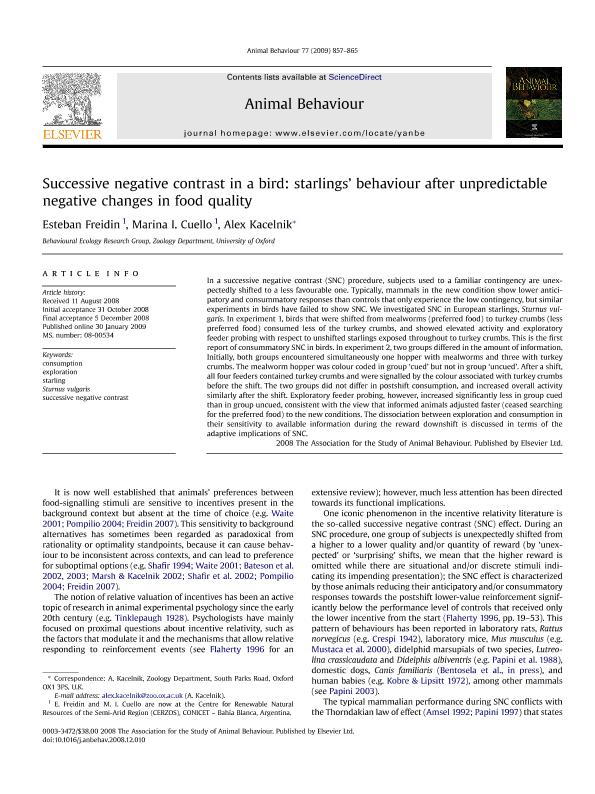Mostrar el registro sencillo del ítem
dc.contributor.author
Freidin, Esteban

dc.contributor.author
Cuello, Marina Ines

dc.contributor.author
Kacelnik, Alex

dc.date.available
2017-10-19T15:17:04Z
dc.date.issued
2009-01
dc.identifier.citation
Freidin, Esteban; Cuello, Marina Ines; Kacelnik, Alex; Successive negative contrast in a bird: starlings' behaviour after unpredictable negative changes in food quality; Elsevier; Animal Behaviour; 77; 4; 1-2009; 857-865
dc.identifier.issn
0003-3472
dc.identifier.uri
http://hdl.handle.net/11336/26804
dc.description.abstract
In a successive negative contrast (SNC) procedure, subjects used to a familiar contingency are unexpectedly shifted to a less favourable one. Typically, mammals in the new condition show lower anticipatory and consummatory responses than controls that only experience the low contingency, but similar experiments in birds have failed to show SNC. We investigated SNC in European starlings, Sturnus vulgaris. In experiment 1, birds that were shifted from mealworms (preferred food) to turkey crumbs (less preferred food) consumed less of the turkey crumbs, and showed elevated activity and exploratory feeder probing with respect to unshifted starlings exposed throughout to turkey crumbs. This is the first report of consummatory SNC in birds. In experiment 2, two groups differed in the amount of information. Initially, both groups encountered simultaneously one hopper with mealworms and three with turkey crumbs. The mealworm hopper was colour coded in group ‘cued’ but not in group ‘uncued’. After a shift, all four feeders contained turkey crumbs and were signalled by the colour associated with turkey crumbs before the shift. The two groups did not differ in postshift consumption, and increased overall activity similarly after the shift. Exploratory feeder probing, however, increased significantly less in group cued than in group uncued, consistent with the view that informed animals adjusted faster (ceased searching for the preferred food) to the new conditions. The dissociation between exploration and consumption in their sensitivity to available information during the reward downshift is discussed in terms of the adaptive implications of SNC.
dc.format
application/pdf
dc.language.iso
eng
dc.publisher
Elsevier

dc.rights
info:eu-repo/semantics/openAccess
dc.rights.uri
https://creativecommons.org/licenses/by-nc-nd/2.5/ar/
dc.subject
Consumption
dc.subject
Exploration
dc.subject
Starling
dc.subject
Succesive Negative Contrast
dc.subject
Sturnus Vulgaris
dc.subject.classification
Otras Psicología

dc.subject.classification
Psicología

dc.subject.classification
CIENCIAS SOCIALES

dc.title
Successive negative contrast in a bird: starlings' behaviour after unpredictable negative changes in food quality
dc.type
info:eu-repo/semantics/article
dc.type
info:ar-repo/semantics/artículo
dc.type
info:eu-repo/semantics/publishedVersion
dc.date.updated
2017-10-09T15:30:09Z
dc.journal.volume
77
dc.journal.number
4
dc.journal.pagination
857-865
dc.journal.pais
Países Bajos

dc.journal.ciudad
Amsterdam
dc.description.fil
Fil: Freidin, Esteban. University of Oxford; Reino Unido. Consejo Nacional de Investigaciones Científicas y Técnicas; Argentina
dc.description.fil
Fil: Cuello, Marina Ines. University of Oxford; Reino Unido. Consejo Nacional de Investigaciones Científicas y Técnicas. Oficina de Coordinación Administrativa Saavedra 15. Centro Interdisciplinario de Investigaciones en Psicología Matemática y Experimental Dr. Horacio J. A. Rimoldi; Argentina
dc.description.fil
Fil: Kacelnik, Alex. University of Oxford; Reino Unido
dc.journal.title
Animal Behaviour

dc.relation.alternativeid
info:eu-repo/semantics/altIdentifier/doi/http://dx.doi.org/10.1016/j.anbehav.2008.12.010
dc.relation.alternativeid
info:eu-repo/semantics/altIdentifier/url/http://www.sciencedirect.com/science/article/pii/S0003347208005745
Archivos asociados
